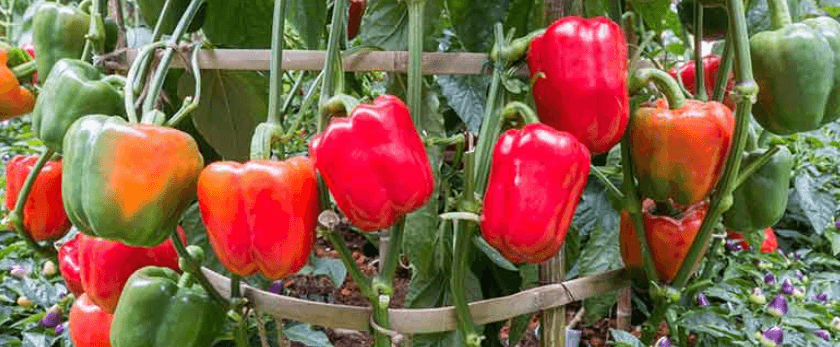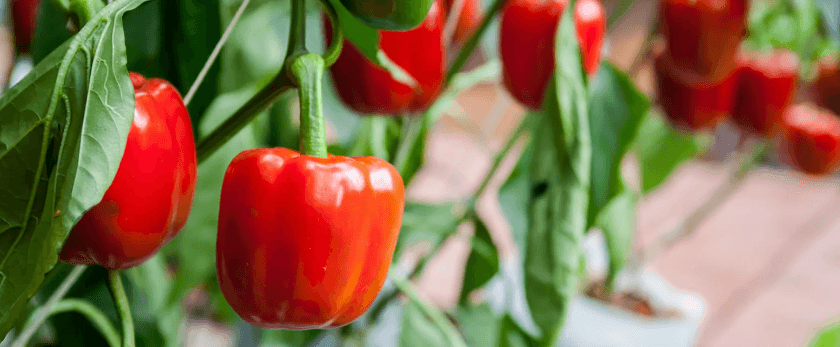Bell peppers are a delicious and versatile vegetable that can be grown in your own backyard. Not only are they a great addition to any meal, but they also provide numerous health benefits. Growing your own bell peppers is not only a fun and rewarding experience, but it also helps reduce your carbon footprint by reducing the need for transportation and packaging. In this article, we will discuss how to care for bell peppers, the best time to grow them, and common problems you may encounter.
How to Care for Bell Peppers
Watering
Bell peppers require consistent watering to thrive. They prefer moist, but not waterlogged, soil. It is important to water them deeply, at least 1 inch per week, rather than frequent shallow watering. This will encourage deep root growth and help the plant withstand dry periods. It is best to water in the morning to allow the leaves to dry before the cooler evening temperatures.
Light
Bell peppers need at least 6-8 hours of sunlight per day. They can be grown in containers or in the ground, but make sure they have access to full sun. If you are growing them in a container, make sure to rotate the pot every few days to ensure even sunlight exposure.
Soil
Bell peppers prefer well-draining, fertile soil with a pH level between 6.0-6.8. If your soil is too acidic, you can add lime to raise the pH level. If it is too alkaline, you can add sulfur to lower the pH level. It is also recommended to add compost or aged manure to the soil before planting to provide essential nutrients.
Fertilizer
Bell peppers are heavy feeders and require regular fertilization. You can use a balanced fertilizer, such as a 10-10-10, every 2-3 weeks. Alternatively, you can use organic fertilizers, such as compost or fish emulsion, every 4-6 weeks. Be careful not to over-fertilize, as this can lead to excessive foliage growth and fewer peppers.
Pruning
Pruning is not necessary for bell peppers, but it can help promote better air circulation and prevent diseases. You can remove any damaged or diseased leaves, as well as any suckers that grow from the base of the plant. It is also recommended to pinch off the first few flowers that appear to allow the plant to focus on growing strong roots and foliage before producing fruit.

Best Time to Grow Bell Peppers
Bell peppers are warm-weather plants and should be planted after the last frost date in your area. They require a long growing season, so it is best to start them indoors 6-8 weeks before the last frost date. This will give them a head start and allow you to transplant them outside once the weather warms up. If you live in a colder climate, you can also grow bell peppers in a greenhouse to extend the growing season.
Common Problems with Bell Peppers
Pests
Bell peppers are susceptible to pests such as aphids, flea beetles, and cutworms. To prevent these pests, you can use natural methods such as companion planting with herbs like basil and marigolds, or using neem oil or insecticidal soap. If you notice any pests, remove them by hand or use a strong stream of water to wash them off the plant.
Diseases
Bell peppers can also be affected by diseases such as bacterial spot, blossom end rot, and powdery mildew. To prevent these diseases, make sure to water at the base of the plant and avoid getting the leaves wet. You can also use a fungicide or copper spray to prevent and treat diseases.
Lack of Fruit
If your bell pepper plant is not producing fruit, it could be due to a lack of pollination. You can hand-pollinate the flowers by gently shaking the plant or using a small paintbrush to transfer pollen from one flower to another. It is also important to make sure the plant is receiving enough sunlight and nutrients.
Conclusion
Growing bell peppers is a fun and rewarding experience that can provide you with fresh, healthy produce right in your own backyard. By following these tips on how to care for bell peppers, the best time to grow them, and how to prevent common problems, you can enjoy a bountiful harvest of delicious peppers. Remember to also practice responsible disposal methods for any waste, such as composting or recycling, to help create a more sustainable future for our planet. Happy growing!










